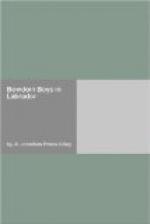[Tickles] As a matter of fact, experience has taught the fishermen to use “tickles,” as narrow passages are called, for harbors, that there may always be a windward and a leeward entrance. In a few cases where the harbor is too small to beat out of, and has no leeward entrance, we have found heavy ring bolts fastened into proper places in the cliffs, to which vessels can make their lines fast, and warp themselves into weatherly position from which a course can be laid out of the harbor.
Meanwhile we are again approaching the Ragged Islands, which we passed just as we were beginning that memorable Sunday evening sail, about fifteen miles from the place we so much dread, Webeck Harbor.
On them we found the only gravel bed we saw in Labrador, and yet their name is due to the rough piled basaltic appearing rock, that proved on close examination to be much weathered sienite and granite. The harbor is an open place amidst a cluster of rocky islets, and we found it literally packed with fishing vessels. Here an afternoon was spent making pictures and examining the geology of these interesting islands, and here the adventure of the kyak, before referred to, took place.
Our fur trader thought he would take a paddle, but had not gone three lengths before he found that he was more expert in dealing with Eskimo furs than in handling Eskimo boats. He rolled over, was soon pulled alongside, and clearing himself from the kyak climbed aboard, just as our gallant mate, his rescuer, rolled out of his dory into the water and took a swim on his own account. All hands were nearly exploded with laughter as he rolled himself neatly into the dory again and climbed aboard, remarking, “That’s the way to climb into a dory without capsizing her,” as he ruefully shook himself. We wanted to ask him if that was the only way to get out of a dory without turning her over, but we forebore.
The next morning as we got clear of the harbor, a trim looking schooner of our size was sighted just off Cape Harrigan, about ten miles ahead. The breeze freshening we gradually overhauled her, and finally, while beating into Holton harbor, one of the most dangerous entrances on the coast, by the way, we passed her, and noticing her neat rig and appearance guessed rightly we had beaten the representatives of the Newfoundland law and the collector of her revenues from this coast.
Mr. Burgess, who combines in one unassuming personage the tax and customs collector, the magistrate and the commissioner of poor relief from Labrador, afterward told us that the “Rose” had been on the coast for thirteen years and had been outsailed for the first time. The next morning we again beat her badly, in working up to Indian Harbor, and only then would he acknowledge himself fairly beaten.
[Puffins and Auks] Saturday, the 22d of August, having yet three days before we were due at Rigolette to meet our Grand River party, we made memorable in the annals of the puffins and auks of the Heron Islands by spending three or four hours there and taking aboard three hundred and seventy-eight of them. Many more of them were killed but dropped into inaccessible places or into the water and could not be saved.




